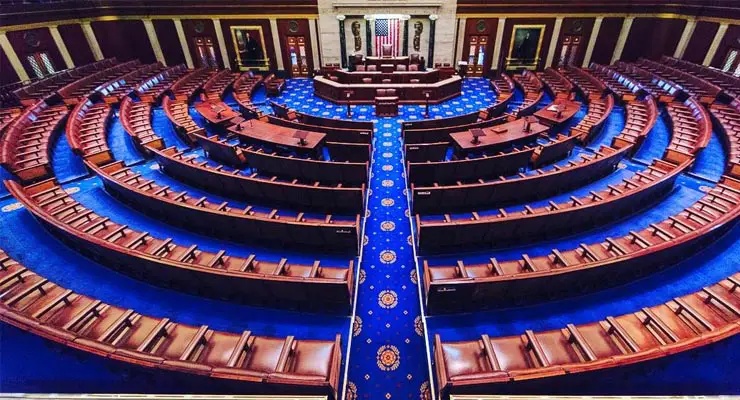Does HR 6666 allow forced entry, testing and quarantine? Fact Check
Conspiracies on social media claim that the proposed legislation HR 6666 would allow government officials to enter homes without consent and force COVID-19 tests on residents. Such conspiracies also claim that people who test positive for COVID-19 can be forcibly removed from their homes and put into quarantine.
 FALSE
FALSE
Most notably, these claims are being spread by Dr. Rashid Buttar, who offers his own breakdown interpretation of the HR 6666 bill, and concludes that the bill would allow government funded teams to forcibly enter the homes of US citizens, forcibly test those inside and remove any residents – “especially children” – who are found to test positive.
Dr. Rashid Buttar is a prolific conspiracy theorist who has been responsible for furthering the spread of a number of unfounded claims, including misinformation about the coronavirus. Previously he has sold “information packages” on his website for hundreds of dollars.
While HR 6666 is a genuine proposed bill – introduced by Bobby L. Rush from Illinois’ 1st District – is contains no mention whatsoever of forced entry, testing or quarantine of residents.
Sponsored Content. Continued below...
The proposed bill is intended to provide financial grants to areas in the United States that have experienced higher volume of COVID-19 cases or that may be underserved from a medical perspective.
According to the text of the bill, dubbed – Testing, Reaching and Contacting Everyone (TRACE) – such grants would go to fund mobile health units, contact tracing and testing.
It is unclear from where Buttar and other conspiracy theorists have drawn their inspiration while peddling these claims that the bill would allow the government or their representatives to forcibly enter, test and quarantine those living in the US. There is nothing in the bill’s text that outlines such measures, or even implies they could be reality.
There are two lines in the bill that mention people’s residences, once in the bill summary…
To authorize the Secretary of Health and Human Services to award grants to eligible entities to conduct diagnostic testing for COVID–19, and related activities such as contact tracing, through mobile health units and, as necessary, at individuals’ residences, and for other purposes.
And another in Section 2a (part 2) –
and to support the quarantine of such contacts, through…
…
(2) as necessary, testing individuals and providing individuals with services related to testing and quarantine at their residences.
However, as is clear from the above extracts, neither claim that people could be forced under any circumstances to comply with entry, testing and quarantine. Nor does it mention this in any other place in the 650 word bill.
In fact, the opposite is stated. In Section 2e of the bill, it is explicitly stated that nothing in the bill would supersede a US resident’s Federal privacy requirements. This of course would include the US Constitution’s 4th Amendment, which protests US citizens from illegal searches and seizures. In short, a US citizen would still have the same rights and freedoms they enjoy from the US Constitution, as specifically stated in HR 6666 itself.
Federal Privacy Requirements.—Nothing in this section shall be construed to supersede any Federal privacy or confidentiality requirement,
Congressman Bobby Rush has responded to many of the claims made online specifically stating that “nothing in this bill will threaten anyone’s individual liberties”.
Question: How can we ensure our liberties will be preserved?
Answer: I have spent my entire life fighting for the liberty of my community & others. There is nothing in this bill that will threaten anyone's individual liberties. Again, this bill is about increasing testing. https://t.co/63pt42plvY
— Bobby L. Rush (@RepBobbyRush) May 12, 2020
Other spin-off conspiracies include the claim that the bill could be used to force citizens into being vaccinated, though this is false largely for the same reasons as explained above.
Another theory claims the grants awarded through the bill will only be given to recipients on the condition that they only allow people vaccinated against COVID-19 to enter their facilities. However since such vaccinations do not exist, this makes little sense. The term ‘vaccination’ is not mentioned in the bill at all.
HR 6666 is currently awaiting debate in the US House of Representatives.
Continued below...
Thanks for reading, we hope this article helped, but before you leave us for greener pastures, please help us out.
We're hoping to be totally ad-free by 2025 - after all, no one likes online adverts, and all they do is get in the way and slow everything down. But of course we still have fees and costs to pay, so please, please consider becoming a Facebook supporter! It costs only 0.99p (~$1.30) a month (you can stop at any time) and ensures we can still keep posting Cybersecurity themed content to help keep our communities safe and scam-free. You can subscribe here
Remember, we're active on social media - so follow us on Facebook, Bluesky, Instagram and X
